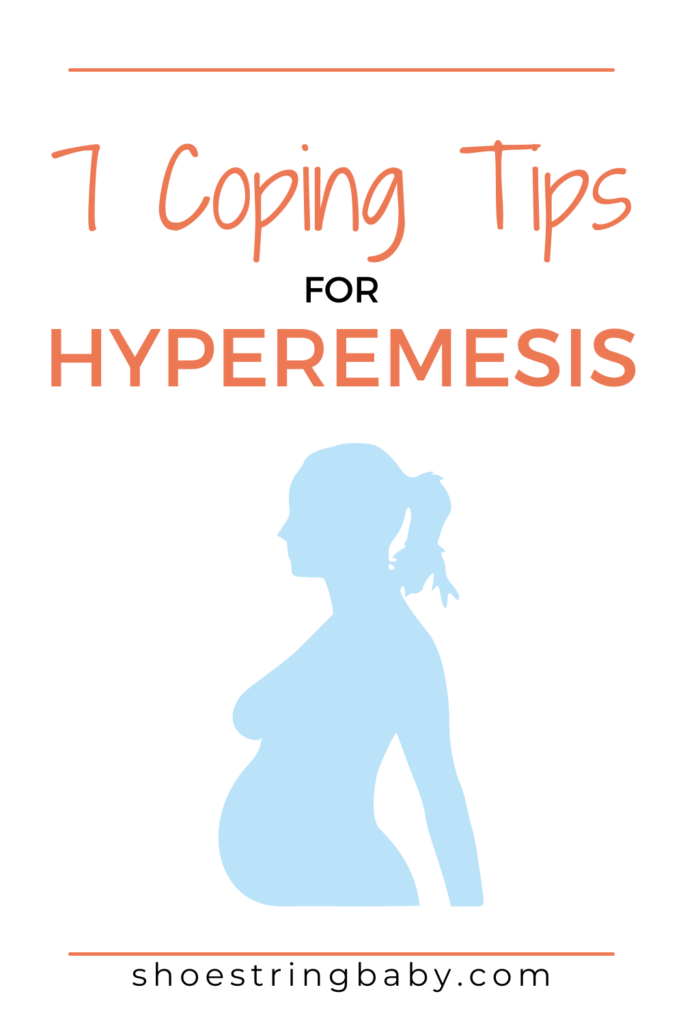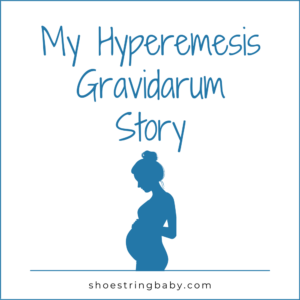7 Tips for Coping with Morning Sickness & Hyperemesis Gravidarum
This post may contains affiliate links. As an Amazon Associate, I earn from qualifying purchases. Read the full disclosure here.
Learn 7 morning sickness and hyperemesis gravidarum tips and tricks from a two-time hyperemesis survivor.
Within weeks of getting my first positive pregnancy test, I was very suddenly, horribly nauseous. I felt sick all day, every day.
At first, I did not realize that unrelenting extreme sickness was not normal morning sickness; or, recognize that I would soon be diagnosed with hyperemesis gravidarum (HG). It was a shock that completely upended my life — and it lasted all pregnancy.
I weighed less when I went into labor than when I got pregnant. I’ve gone on to have a second hyperemesis pregnancy and I am still in recover from months of starvation and pregnancy complications.
So let’s just say I have way too much experience with morning sickness.
But I am one of the lucky ones. My hyperemesis was proactively and compassionately managed by great doctors. I had financial security and health insurance for medications, hospital trips and daily IV fluids through a PICC line. And we had a support network at the ready.
Even with all that, extreme morning sickness and HG are still terrible and traumatic. It is only now that I am postpartum and in recovery that I’m processing the lessons I learned from my long, literally nauseating experience.
I’m often sought out by friends looking for advice when they, or someone they love, start to experience morning sickness. Below you’ll find 7 tips for coping with morning sickness and hyperemesis gravidarum that I share with newly pregnant friends dealing with morning sickness or HG.
These tips focus on lifestyle management and self-advocacy and not medical recommendations. Hyperemesis also requires a care plan, and often medications, from your doctor.
Always seek out medical advice from your doctor and get help if you cannot hydrate or stop puking.

Coping Tips for Morning Sickness & Hyperemesis Gravidarum
1: Be proactive & ask for help early
If pregnancy-related nausea is drastically limiting your ability to live normally, ask for help early. Getting help early got me diagnosed faster and I believe kept me out of the hospital longer.
My 24/7 nausea set in before my first doctor’s appointment so I tried all the usual recommendations (ginger, crackers, etc.) and over-the-counter medicines (Unisom and B6) before I saw the doctor. Having an exhaustive list of what hadn’t worked allowed us to jump ahead to prescription options.
My doctor readily gave me a hyperemesis diagnosis so I wouldn’t have problems with being taken seriously or accessing prescription medicines. I truly believe this early diagnosis (and a ready supply of Zofran) reduced the number of hospital trips I had to make.
I still felt like I was dying and was most certainly starving, but I did not suffer through the endless puking cycles many hyperemetic women face.
2: Prepare to advocate for yourself
Not everyone’s doctor experience is going to go as wonderfully as mine did. Unfortunately, as many women know from past experience navigating our health system, sometimes women’s health issues are downplayed or not taken seriously. You need to be prepared to advocate for yourself.
Start taking records of your illness now in case you need it later.
I did not weigh myself during early pregnancy and had no idea how quickly I was losing weight. I had lost 6% of my body weight without even realizing (I would ultimately lose over 10% of my body weight during my hyperemesis illness).
The first time I was weighed during pregnancy was the appointment I got sent to the hospital, and my unrecognized weight loss was a contributing factor. Knowing your weight loss could also help get an HG diagnosis.
I also wish I had kept better records of what I ate and how much fluid I consumed in a day. The rule of thumb from my doctor was to go to the hospital if you hadn’t kept anything down in 12 hours. It also helped to know my consumption data when having discussions with my doctors.
I was a bit of an HG anomaly in that I could eat and drink some without puking if I had enough Zofran on board. Technically, I would have never hit the 12 hour criteria for I.V. fluids; but, what I ate was insufficient for my metabolism and I was wildly malnourished.
Guidelines are not one-size-fits-all.
I ultimately started self-monitoring my starvation with at-home ketone urine testing. You can pick these up at a drugstore for about $10. The tests I got had instructions on the packaging for how to read the strips, and I would do a test each morning.
3: There are more rehydration options than Gatorade
Most people reach for a Gatorade and other sports drinks when they are dehydrated. For me, Gatorade was too sweet at the height of my hyperemesis.
Luckily, there are more options for oral rehydration, including: Pedialyte, Nuun tablets, Normalyte, or broth. There are also many recipes to make your own solutions which you can adapt to fit your aversions.
I drank broth every day of my pregnancy (much to my chagrin by the end). I also really appreciated PediaLyte and NormaLyte’s flavorless, sugarless options.
I.V. fluid rehydration is also an option when medically necessary. The I.V. fluids I got at the hospital made me feel so much better, temporarily. So much so that during my second pregnancy, I requested in-home infusions with a home health nurse. I personally had a PICC line but regular I.V.s at an infusion center are also an option for HG sufferers.
4. Practical tips on puking
You probably are going to puke sometimes, even with the best medicine. There are a few things to keep in mind for for puke sessions.
- Always have extra plastic bags on you wherever you go. Always.
- Take it slow and easy on liquids and foods after vomiting. I’d take small sips of liquid very slowly and wait before trying to eat. Drinking too much, too fast could trigger another vomiting cycle.
- Instinct tells you to brush your teeth after puking but this actually rubs stomach acid into your teeth. If you are repeatedly puking, this may damage your teeth over time. Instead, gargle with water & baking soda to neutralize the acid and wait about 30 minutes before brushing. More on teeth below!
5. Don’t Neglect Your Teeth (and try Xylitol Gum!)
This tip is one of the first things I share with friends struggling with morning sickness or hyperemesis because I wish I had known it sooner. Hyperemesis is hard on your teeth and brushing them can feel impossible when you are sick. I deeply regret not getting xylitol gum earlier in my pregnancies when I couldn’t brush well.
The vomiting, gagging with toothbrushing, and the mouth-drying medicines and dehydration all add up for trouble for your teeth. I struggled with brushing my teeth without gagging or puking every day I was pregnant. Often, I could tell what kind of nausea-day I was going to have by how hard it was to brush my teeth in the morning.
It caught up with me during my second pregnancy when I got a cavity very quickly. I had actually called my dentist’s office to ask for advice as I got sick but I don’t think they understood the gravity of HG.
It was only after the cavity that I learned about xylitol gum as a cavity-fighter. If you can’t brush, you can chew xylitol-gum throughout the day to fight plaque. Learning about this too late was one of my biggest regrets from my second pregnancy.
Here is a blurb on it from the HER Hyperemesis Foundation:
There was less plaque biofilm in the mouths of the [those chewing xylitol-gum for a week instead of brushing] than when they brushed their teeth before the study started. That’s because the chemical component of Xylitol interferes with plaque’s ability to cling together or deposit itself on the teeth.
6. Connect online
Hyperemesis is an isolating experience even in the best of times. I did not feel well enough to see friends, could not go out to restaurants because of aversions and smells, and just generally was too weak to leave the couch. For the first half of my pregnancies, even screens made me nauseous so I couldn’t text loved ones.
I craved the understanding of others living through hyperemesis and pregnancy, so I leaned heavily into online communities (once the screen-nausea subsided) like the HER Foundation’s Support Groups and instagram. I spent a lot of time on subreddits for my due date month and my pregnancy complications.
And, I truly cannot rave enough about the HER foundation’s monthly zoom HG support group that takes place every third Thursday of the month.
I devoured so many women’s stories. I needed to not feel alone in this experience and am thankful to all the anonymous online women for sharing their lives with me in that way.
Paying forward this connection is a huge motivator for me writing this now.
7. Don’t doubt yourself
I spent my whole pregnancy wondering if I was sick enough.
I worried that I was not trying hard enough to eat and live. I thought I was being dramatic. I read about other people whose hyperemesis was so much worse, so I felt I shouldn’t be considered ‘sick’ too.
But I was sick. I was very sick.
Just because someone else’s experience sounds worse, it doesn’t make you any less sick or deserving of care. Don’t let self doubt keep you from asking for care that can improve your life and your health.
There is enough Zofran for all of us.
As a final note, there will be others who do not understand extreme morning sickness. A lot of people had regular morning sickness or know someone who did. They may think they understand because of that.
They may downplay your experience. They will suggest ginger.
Most people mean well, but don’t let others’ lack of validation keep you from believing your own bodily experience.
We are the one’s putting a face and a story to a women’s health issue that needs more awareness, research and funding. Share your pregnancy experience, puke and all.
I hope you found some useful information on how to cope with hyperemesis gravidarum from this list. Want to learn more about my experience with hyperemesis? Check out: My Hyperemesis Story and 7 Things I’d Do Differently with HG





